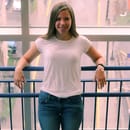Could you tell me a little about the first camera you owned and the types of pictures you took with it?
CO: My first camera was a Polaroid one-step camera. I was eight years old, I only took photos of my family then.
What drove you to choose photojournalism as a career?
CO: I didn’t really choose photojournalism at first, I was advised by a high school photography teacher to attend Western Kentucky University because it had the best photo program in my home state of Kentucky, at the time I knew nothing about photojournalism. I didn’t have a passion for photojournalism until I enrolled at Western and starting learning about photojournalism through my classes and internship.
How does your job differ from the one you envisioned yourself in college?
CO: I never thought I would ever do the things that I have because of working as a full-time photojournalist. My career has totally exceeded my expectations. Prior to college I just wanted to be a photographer, maybe fashion or corporate type work. I never would have imagined that I would have met so many great people in the communities I have worked in. Covering major sporting events and politics have been a very exciting part of my job and I didn’t think back when I started out that I would enjoy as much as I do.
Are there any difficulties that your male colleagues do not have when it comes to working that you have encountered?
CO: Sports can be challenging. Not as many female photojournalists who shoot sports. I have had issues covering some of the major sporting events across the country.
Are there any women in your field that you admire or look up to?
CO: Yes, there a few women who were some great mentors for me when I was starting out in my career. There a couple now who I admire and keep in contact with.
What are the skills that you developed as a staff journalist that you didn’t learn in college?
CO: Learning how to approach people especially for a sensitive topic. Some pretty basic stuff like always preparing for the worse. Many times when covering breaking news the days can go pretty long. I keep rain gear, gym shoes, a jacket, plastic, a towel, extra socks/jeans in my car at all times.
You moved after Hurricane Katrina from New Orleans to Cincinnati. How do these locations differ in photojournalism reporting? Example, the different issues facing the community.
CO: The people in New Orleans are much more friendlier, that was the big challenge. Many of the issues are the same in both cities, that have [a] high rate of poverty.
What was your favorite picture that you took in New Orleans? What was your favorite picture that you took in Cincinnati?
CO: I don’t think I have a favorite picture that I have taken in both cities, I have several in both cities that I like for different reasons.
“Seven Days of Heroin” is a narrative and video documentary project by the Cincinnati Enquirer to highlight the city’s rampant drug problem.
What was the inspiration behind the series “Seven Days of Heroin” which highlighted the ongoing opioid crisis in the area?
CO: The inspiration came from our editor and full-time opioid reporter. The crisis was and still continues to get worse, we thought we could look at much as we could in one week.
How did that series affect you and your team emotionally to photograph?
CO: It was really tough especially for me after one of my subjects overdosed and died 10 days after I did a video interview and photos with her and her baby. For some of the other staff, they were emotionally drained because of the sadness of the overall crisis, seeing people homeless because of their addictions and because of subjects who were hurt because they lost loved ones to the disease of drug addiction.
You received a Pulitzer Prize for your work on “Seven days of heroin” can you describe the feeling that you felt in that moment?
CO: After I realized that we had actually won, Tears of joy.
How important is it to mentor the new photojournalists in the field?
CO: Mentors were essential to my growth, without them I don’t think I would be where I am in my career. I also want to mentor new photojournalists because we need them to be [a] great journalist for our democracy.
Can you give advice to women aspiring to be photojournalists?
CO: Always believe in yourself, but don’t be afraid to ask for help. I have had both female and males to help me with a wide variety of things in this industry. Everything to helping me come up with ideas for a non-visual story, to technical issues with my cameras or laptop, giving me an edit from an assignment.
If someone gives you a hard time on an assignment, (example seat assignments covering sports) and you see male photographers be treated differently don’t be afraid to call them out on it. This has happened to me covering NCAA March Madness.
Have confidence, mine wasn’t the strongest when I started out, but I pushed myself to just get out there and do. At times I felt intimidated moving around a lot covering certain events, that helped me tremendously and my confidence has made a major difference in my career. In this field if people (especially in a tense or sensitive situation) can tell someone is timid at many times won’t give you [the] info you need or may run you off.

